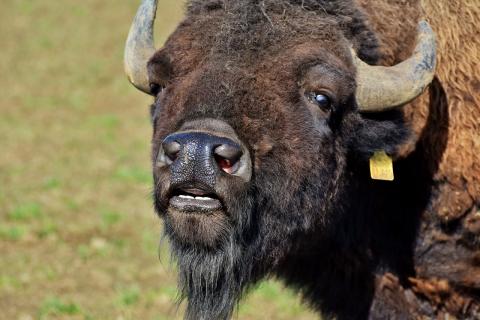Developing a blueprint for controlling malignant catarrhal fever (MCF) in bison, buffalo, and cattle in Wales
In the UK and Wales, some pioneering producers have found a ready market for bison meat. It is considered to be a healthy red meat alternative to traditional beef products being lower in fat, cholesterol and sodium. It also has a very similar protein content, is lower in calories and is high in iron and vitamin B12.
Compared to beef in the UK, bison meat is worth considerably more, with deadweight prices for bison approximately twice that for cattle, and retail prices for bison meat frequently more than 1.5 times that of beef.
Bison are however challenging, not only due to their temperament and sensitivity to stress but also their increased susceptibility to malignant catarrhal fever (MCF), which is considered the disease-limiting factor to successful production.
MCF (caused by the virus OvHV-2) can affect cattle, bison, water buffalo, deer, yak and sheep are considered the main reservoir host. However, bison, buffalo and deer are considered to be much more susceptible than cattle and this is one of the main hurdles for farmers wanting to diversify into these lucrative niche markets.
This project involved two farms, Rhug Estate in Corwen which have a herd of bison and the Buffalo Dairy in Llanon, which investigated possible steps farmers can take to control MCF, which is currently lacking within the niche sector.
Project Outcomes
- Blood samples were taken from the bison/buffalo/cattle/sheep on each farm to test if they at the time had, or had been exposed to OvHV-2 to increase the understanding of the risk they posed to in contact bison, buffalo, and cattle.
- The disease profile for each herd was analysed from all the available data and a control strategy developed tailored to each farm as a result.
- For Rhug Estate, overall, the general health of the bison appeared to be improved, as evidenced by the visual improvements and the measurable improvements in body condition.
- For Buffalo Dairy no significant health events occurred during the monitoring period, and production was also reported to be good.
- Stress to the animals due to handling remains a difficult factor to manage regarding their susceptibility to diseases such as MCF. Combining necessary events e.g. parasite control, trace element supplementation and statutory testing to minimise further handling is essential to minimise the number of stress events experienced by the bison.
- The MCF vaccine used at Rhug Estate in this study was experimental and is unavailable for use on other farms at this stage. No vaccine associated adverse events were detected and the bison appeared to be clinically well as a result of the vaccine. However, it is not possible to say from the results of this project whether the vaccine prevented infection or disease in the bison.

